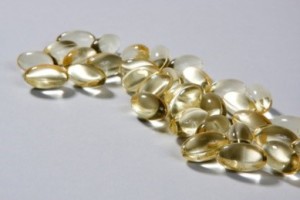Does Vitamin E Matter?
Author: Dr. Stephen Chaney
 A headline claiming “Over 90% of Twentysomethings Have Suboptimal Vitamin E Status” caught my eye the other day, so I decided to investigate further. If you have been following all of the information and misinformation about vitamin E in the online media, you are probably confused – and this headline just adds to the confusion. There are probably three basic questions you want answered:
A headline claiming “Over 90% of Twentysomethings Have Suboptimal Vitamin E Status” caught my eye the other day, so I decided to investigate further. If you have been following all of the information and misinformation about vitamin E in the online media, you are probably confused – and this headline just adds to the confusion. There are probably three basic questions you want answered:
- Is the latest study valid? Are most Americans vitamin E deficient?
- Does it matter? Vitamin E has been described as “a vitamin in search of a disease”. If there are no diseases associated with vitamin E deficiency, should we even be concerned if most Americans are vitamin E deficient?
- Is there any value to vitamin E supplementation? You will see claims that vitamin E supplementation has been proven not to work. Are these claims valid?
Let me guide you through the maze. I will start by analyzing the study behind the current headlines.
Are Americans Vitamin E Deficient?
 The best food sources of vitamin E are nuts, seeds and unrefined vegetable oils, followed by green leafy vegetables. Since these foods are not abundant in the American diet, it is no surprise that previous studies have shown that 83% of US children and 91% of US adults do not consume the recommended 12 mg/day of vitamin E. Consequently, the 2015 Dietary Guidelines Advisory Committee identified vitamin E as a “shortfall nutrient”.
The best food sources of vitamin E are nuts, seeds and unrefined vegetable oils, followed by green leafy vegetables. Since these foods are not abundant in the American diet, it is no surprise that previous studies have shown that 83% of US children and 91% of US adults do not consume the recommended 12 mg/day of vitamin E. Consequently, the 2015 Dietary Guidelines Advisory Committee identified vitamin E as a “shortfall nutrient”.
This study (McBurney et al, PLoS One 10(8): e0135510 doi: 10.1371/journal.pone.0135510) took the next logical step by asking whether the inadequate intake of vitamin E lead to inadequate blood levels of the vitamin. The authors analyzed data from 7,922 participants who had their blood levels of alpha-tocopherol (the most abundant form of vitamin E) determined in the 2003-2006 National Health and Nutrition Examination Survey (NHANES).
They subdivided participants into those who used no supplements (4049) and those who used supplements (3873). (Note: The supplement users were not necessarily using vitamin E supplements, but many were using a multivitamin supplement containing vitamin E). The authors compared the study participant’s blood levels of vitamin E with the Institute of Medicine standard for vitamin E deficiency (12 umol/L) and with a standard they set for adequate vitamin E levels (30 umol/L). Here are the results of their analysis:
- People who did not use supplements had lower blood levels of vitamin E (24.9 umol/L) than those who used supplements (33.7 umol/L). No surprise here.
- Only 0.6% of Americans were clinically deficient in vitamin E (blood levels < 12 umol/L). The prevalence of vitamin E deficiency did not vary significantly with age, gender or ethnicity.
- When they looked at the people not using supplements, the percentage with suboptimal vitamin E status (blood levels < 30 umol/L) varied significantly by age, but was not significantly affected by gender or ethnicity. In this analysis the percentage with suboptimal vitamin E status was:
- 7% for ages 20-30.
- 8% for ages 31-50
- 2 % for ages 51 and above
Were The Headlines Correct?
 Technically speaking the headlines were correct. 92.7% of Americans aged 20-30 who used no supplements had suboptimal blood levels of vitamin E as defined in this study. When you combined both supplement users and non-users, the percentage with suboptimal blood levels of vitamin E was only slightly less (87.4%). However, there are a couple of important caveats:
Technically speaking the headlines were correct. 92.7% of Americans aged 20-30 who used no supplements had suboptimal blood levels of vitamin E as defined in this study. When you combined both supplement users and non-users, the percentage with suboptimal blood levels of vitamin E was only slightly less (87.4%). However, there are a couple of important caveats:
- There is no internationally recognized standard for adequate blood levels of vitamin E. The authors had a reasonable rationale for choosing 30 umol/L as their standard for adequate blood levels, but they also acknowledged that the Estimated Average Requirement of vitamin E from food (12 mg/day) would result in a blood level of 27.9 umol/L, so their standard may be a bit high.
- The average blood level of vitamin E for non-supplement users was 24.9 umol/L. While that is less than adequate, it is only slightly low – especially if the lower standard of 27.9 umol/L is used.
I think it would be more accurate to say that a large percentage of Americans have blood levels of vitamin E that are slightly below what is considered adequate but are far above what could be considered clinically deficient. The question then becomes “Does it matter?”
Does Vitamin E Matter?
Let me start with a little perspective. In the United States diseases like scurvy, pellagra and beriberi are things of the past. We simply don’t see deficiency diseases anymore. What we do see are intakes of essential nutrients that are slightly below optimal. Vitamin E is no different.
If we focus on suboptimal nutrient intake by itself, the answer would probably be that it doesn’t matter. Suboptimal nutrition is seldom enough to cause poor health by itself.
However, we also need to take into account individual differences that affect the need for essential nutrients. Poor health is much more likely to arise when suboptimal intake of one or more essential nutrients is coupled with increased needs due to genetic predisposition, risk factors that predispose to disease, and/or pre-existing disease.
With this perspective in mind, we are ready to ask whether suboptimal intake of vitamin E or any other essential nutrient matters. The answer is pretty simple. It doesn’t matter for everyone, but it matters very much for those individuals with increased needs.
If we had a good way of assessing individual nutritional needs, it would be easy to say who needed supplements and who didn’t. The problem is that we currently have no good way of assessing individual needs for essential nutrients. We simply cannot predict who will and who won’t be affected by suboptimal nutrient intake. That is why millions of Americans take supplements on a daily basis.
Is There Any Value To Vitamin E Supplementation?
 That brings us to the final question. Is vitamin E supplementation a waste of money? You’ve probably already heard that most studies have failed to show any benefit from vitamin E supplementation, but you may be asking “How can that be when we also know that most Americans are getting suboptimal levels of vitamin E in their diet?”
That brings us to the final question. Is vitamin E supplementation a waste of money? You’ve probably already heard that most studies have failed to show any benefit from vitamin E supplementation, but you may be asking “How can that be when we also know that most Americans are getting suboptimal levels of vitamin E in their diet?”
With the perspective I described above in mind, the answer is pretty simple. Those studies have been asking the wrong question. They have been asking whether vitamin E supplements benefit everyone. They haven’t asked whether vitamin E supplements benefit people with increased needs.
When you ask that question the answer is very different. Let me give you three examples – one representing each of the kinds of increased need I described above:
- In the Women’s Health Study (JAMA, 294: 56-65, 2005) vitamin E supplementation had no effect on heart attack or stroke in the general population. But when they looked at women over 65 (those at highest risk for heart disease), vitamin E supplementation reduced heart attack and stroke by 25% and cardiovascular deaths by 49%
- In the Women’s Antioxidant Cardiovascular Study (Archives Internal Medicine, 167: 1610-1618, 2007) vitamin E supplementation again had no effect on cardiovascular events overall. But when they looked at the women who had cardiovascular disease at the start of the study, vitamin E supplementation decreased cardiovascular events by 23%.
- In the Heart Outcome Prevention Evaluation Study (Diabetes Care, 27: 2767, 2004; Atherosclerosis, Thrombosis & Vascular Biology, 24: 136, 2008) vitamin E supplementation had no effect overall on heart attacks or cardiovascular deaths. But when they looked at a population who had a haptoglobin genotype that significantly increases the risk of heart disease, vitamin E supplementation significantly decreased the risk of both heart attacks and cardiovascular deaths.
The Bottom Line
- Recent headlines saying that over 90% of young Americans have suboptimal vitamin E status are technically correct, but a bit overstated. It probably would have been more accurate to say that most Americans have slightly suboptimal vitamin E status.
- The important question then becomes “Do marginal nutritional deficiencies matter?” The answer is pretty simple. Marginal nutritional deficiencies do not matter for everyone. However, they matter very much for those people who have increased needs for that nutrient due to genetic predisposition, risk factors for disease or pre-existing disease.
- If we had a good way of assessing individual nutritional needs, it would be easy to say who needed supplements and who didn’t. However, we don’t have a good way of assessing increased needs for most nutrients, which is why many Americans use supplements on a daily basis.
- As for all of those studies saying that vitamin E supplementation has no benefit, they are a bit misleading because they are asking the wrong question. They are asking whether vitamin E supplementation benefits everyone. They are not asking whether vitamin E supplementation benefits people with increased needs. When you ask that question the answer is very different (see examples in the article above).
These statements have not been evaluated by the Food and Drug Administration. This information is not intended to diagnose, treat, cure or prevent any disease.
